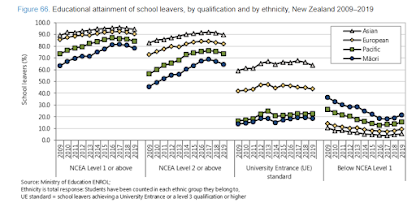According to today's Economist
A commission in Britain that was created after last year’s Black Lives Matter protests to investigate racial disparities concluded that race is less important than social class and family structure in explaining inequality. On schooling, the report found that most children from ethnic-minority groups did as well or better than their white peers. It added that the catch-all term BAME (black, Asian and minority ethnic) was not very useful. The report contradicted the claims of critical race theorists, some of whom claim that white privilege is the prime cause of most disparities.
It's lengthy and I have only scanned through it but the conclusion, which I've reproduced here in full gives some idea of the clarity of thought and open-mindedness demonstrated by the commissioners. You can download the report from:
"We have tried in this report to present a new race agenda for the country, relevant to people from all backgrounds.
Rather than just highlighting minority disparities and demanding the government takes action, we have tried to understand why they exist in the first place.
That has meant some challenging conversations about today’s complex reality of ethnic advantage and disadvantage, a reality no longer captured by the old idea of BAME versus White Britain.
We have focused not just on persistent race-based discrimination but on the role of cultural traditions, including family, within different minority groups, the overlap between ethnic and socio-economic disadvantage, and the agency we have as individuals and groups.
And we believe that perhaps more than previous reports on these issues a degree of optimism is justified. Our agenda is rooted in the significant progress we have made as well as the challenges that remain.
We were established as a response to the upsurge of concern about race issues instigated by the BLM movement. And we owe the mainly young people behind that movement a debt of gratitude for focusing our attention once again on these issues.
But most of us come from an older generation whose views were formed by growing up in the 1970s and 1980s. And our experience has taught us that you do not pass on the baton of progress by cleaving to a fatalistic account that insists nothing has changed.
And nor do you move forward by importing bleak new theories about race that insist on accentuating our differences. It is closer contact, mutual understanding across ethnic groups and a shared commitment to equal opportunities that has contributed to the progress we have made.
Too many people in the progressive and anti-racism movements seem reluctant to acknowledge their own past achievements, and they offer solutions based on the binary divides of the past which often misses the point of today’s world.
We have paid close attention to the data and tried to avoid sweeping statements or over-ambitious targets and recommendations. Instead, our recommendations have tried to account for the messy reality of life and have been aimed, where possible, at everyone who is disadvantaged, not just those from specific ethnic groups.
Many of our recommendations, on Class B drugs or extending school hours for example, are aimed especially at the COVID-blighted generation of young people. Others focus on better use of data and the development of digital tools to promote fairness at work or for keeping young people out of trouble.
We have also acknowledged where we do not know enough and called for further research on what works in promoting fairness at work, and the role of the family and the reasons behind the success of those minority groups that have been surging forward into the middle class and the elite.
We focused our recommendations on the 4 broad categories of change that the Commission wishes to affect – build trust, promote fairness, create agency, and achieve inclusivity – and never assumed that minorities are inert victims of circumstance. As mentioned in the foreword the fact that most of us are successful minority professionals has no doubt shaped this thinking. And our experience of ethnic minority Britain from the inside makes it obvious to us that different groups are distinguished in part by their different cultural patterns and expectations, after all that is what multiculturalism was supposed to be about. It is hardly shocking to suggest that some of those traditions can help individuals succeed more than others.
Beneath the headlines that often show egregious acts of discrimination, the Windrush scandal most recently, incremental progress is being made as our report has shown beyond doubt. Through focusing on what matters now, rather than refighting the battles of the past, we want to build on that progress.
Finally, a thanks to all those individuals and organisations from across the country who gave us their time to to share their perspectives and evidence, and explain how their inspiring projects are helping to build a fairer Britain.
The year 2022 promises to be a special one: a new energy as we are fully released from COVID captivity, The Queen’s 70th Jubilee and the Commonwealth Games in Birmingham. And we hope it will be infused with the spirit of British optimism, fairness and national purpose that was captured by that 2012 Olympic opening ceremony, and has animated this report."

















